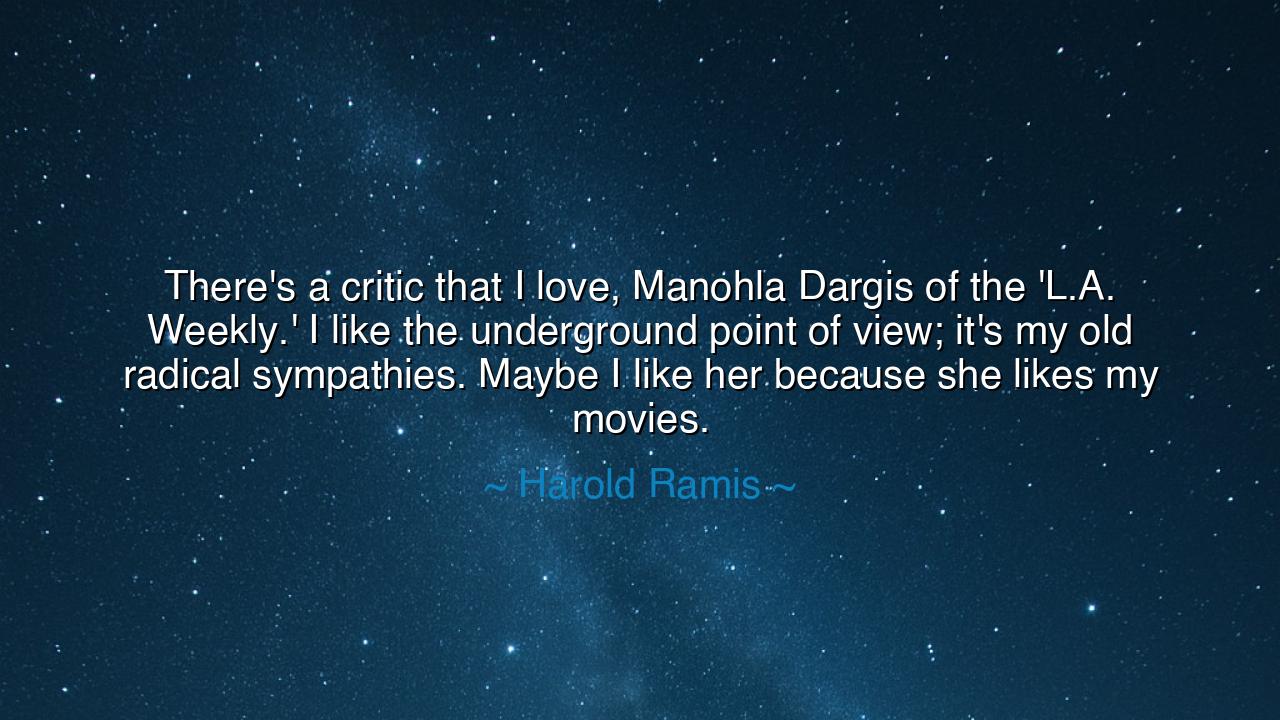
There's a critic that I love, Manohla Dargis of the 'L.A.
There's a critic that I love, Manohla Dargis of the 'L.A. Weekly.' I like the underground point of view; it's my old radical sympathies. Maybe I like her because she likes my movies.






Hear, O seekers of wisdom, the words of Harold Ramis, the master of laughter and quiet philosopher of film: “There’s a critic that I love, Manohla Dargis of the ‘L.A. Weekly.’ I like the underground point of view; it’s my old radical sympathies. Maybe I like her because she likes my movies.” In these lines, both humble and wry, we see not only a confession of affection but a meditation on the deep bond between the creator and the one who interprets creation. For the artist does not live in isolation, but in dialogue with those who receive his work, and sometimes, this dialogue is a union of spirit.
Ramis, a man whose comedies carried the wisdom of satire, reminds us here that even the greatest creators long for recognition—not from the masses alone, but from those who look deeper, who see the hidden roots of their craft. A critic like Dargis, known for her keen perception and fearless honesty, becomes not merely a judge, but a companion to the artist, shining light on the hidden layers of meaning. When Ramis speaks of his “radical sympathies,” he reveals that he cherished voices that questioned the powerful, that favored the overlooked, that celebrated the subversive. Thus, in the critic, he found an echo of his own spirit.
This truth has long existed. Consider the partnership between Plato and Socrates. Though Socrates himself wrote nothing, Plato became his critic and interpreter, preserving his thought for generations. In that dialogue of thinker and writer, the philosophy of the ages was born. Without the critic who listens deeply and reflects faithfully, the voice of the creator risks being lost in noise. Ramis’ fondness for Dargis reveals his awareness of this eternal cycle: the artist speaks, but the critic ensures the voice is heard.
There is also humility in his jest—“Maybe I like her because she likes my movies.” Here, he admits what every artist knows but seldom confesses: that praise nourishes. Even the boldest innovators crave not applause alone, but the assurance that someone truly understands what they have done. Recognition from one who sees with clarity is a balm to the artist’s doubts. Thus, Ramis reveals himself not as a towering genius untouched by opinion, but as a man grateful for empathy, as we all are.
The meaning is twofold: first, that sympathies shape our affections, drawing us toward those who share our worldview; and second, that art thrives not only in creation but in reception. The underground voice, the radical critic, the daring interpreter—these are as essential to the survival of truth as the artist himself. For without listeners who can discern, the song may fall upon deaf ears, and its power be lost.
The lesson, O listener, is clear: seek those who understand you, and cherish them. If you are a creator, value the critic who sees your intent, even if their words are sharp. If you are a critic, speak not to wound but to illuminate, for you may become the bridge that carries a great work into the hearts of many. And in your life, beyond art, honor those who share your hidden sympathies, for with them you will find not only understanding, but the strength to endure.
And so, let Ramis’ words endure as teaching: art is not a solitary flame but a fire kept alive by many hands—the creator, the critic, and the audience together. To dismiss the critic is to miss the echo of your own soul; to welcome them is to find camaraderie in the endless struggle to speak truth. Remember this, and in your own journey, cherish those who see you clearly, for their vision will sustain you when your own light flickers.
Thus, let this wisdom pass down: true sympathy is found where voices echo one another, and true movies, like all art, live longest when carried by both the maker and the interpreter into the hearts of generations yet to come.






AAdministratorAdministrator
Welcome, honored guests. Please leave a comment, we will respond soon